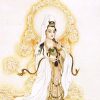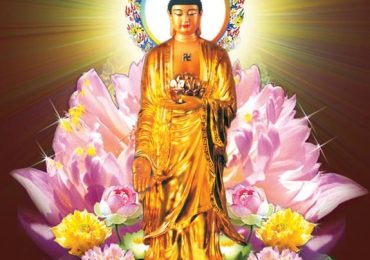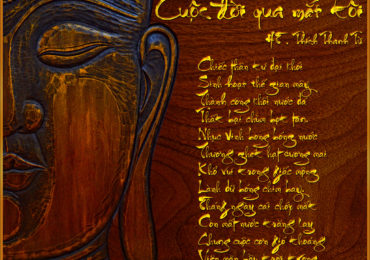THE WORM
Ajahn Brahmavamso
There is a wonderful little story about two monks who lived together in a monastery for many years; they were great friends. Then they died within a few months of one another. One of them got reborn in the heaven realms, the other monk got reborn as a worm in a dung pile. The one up in the heaven realms was having a wonderful time, enjoying all the heavenly pleasures. But he started thinking about his friend, “I wonder where my old mate has gone?” So he scanned all of the heaven realms, but could not find a trace of his friend. Then he scanned the realm of human beings, but he could not see any trace of his friend there, so he looked in the realm of animals and then of insects. Finally he found him, reborn as a worm in a dung pile… Wow! He thought: “I am going to help my friend. I am going to go down there to that dung pile and take him up to the heavenly realm so he too can enjoy the heavenly pleasures and bliss of living in these wonderful realms.”
So he went down to the dung pile and called his mate. And the little worm wriggled out and said: “Who are you?”, “I am your friend. We used to be monks together in a past life, and I have come up to take you to the heaven realms where life is wonderful and blissful.” But the worm said: “Go away, get lost!” “But I am your friend, and I live in the heaven realms,” and he described the heaven realms to him. But the worm said: “No thank you, I am quite happy here in my dung pile. Please go away.” Then the heavenly being thought: “Well if I could only just grab hold of him and take him up to the heaven realms, he could see for himself.” So he grabbed hold of the worm and started tugging at him; and the harder he tugged, the harder that worm clung to his pile of dung.
Do you get the moral of the story? How many of us are attached to our pile of dung?
THE THIEF
Tibetan teaching story
‘The 12th century master Geshe Ben was renowned for his goodness and integrity.
Once, while begging for alms, a family of devout Buddhists invited him to their home to be fed. He was so hungry that he found it difficult to wait while his hosts were elsewhere preparing the meal. To his complete shock he found himself stealing food from a jar when no-one was looking. Geshe Ben suddenly burst into loud cries of “Thief! Thief! I’ve caught you red-handed.”
His hosts rushed into the room to find him berating himself and threatening his hand with being cut off it ever behaved like that again.’
THE LOST SON
“A young widower, who loved his five year old son very much, was away on business when bandits came who burned down the whole village and took his son away. When the man returned, he saw the ruins and panicked. The took the burnt corpse of an infant to be his son and cried uncontrollably. He organised a cremation ceremony, collected the ashes and put them in a beautiful little bag which he always kept with him.
Soon afterwards, his real son escaped from the bandits and found his way home. He arrived at his father’s new cottage at midnight and knocked at the door. The father, still grieving asked: “Who is it?” The child answered, it is me papa, open the door!” But in his agitated state of mind, convinced his son was dead, the father thought that some young boy was making fun of him. He shouted: “Go away” and continued to cry. After some time, the child left.
Father and son never saw each other again.”
After this story, the Buddha said: “Sometime, somewhere, you take something to be the truth. If you cling to it so much, even when the truth comes in person and knocks on your door, you will not open it.”
ANGRY BUDDHA
From “Being Peace” by Thitch Nhat Hahn
“A woman who practices reciting Buddha Amitabha’s name, is very tough and recites “NAMO AMITABHA BUDDHA” three times daily. Although she is doing this practice for over 10 years, she is still quite mean, shouting at people all the time. She starts her practice lighting incense and hitting a little bell.
A friend wanted to teach her a lesson, and just as she began her recitation, he came to her door and called out: “miss Nuyen, miss Nuyen!”.
As this was the time for her practice she got annoyed, but she said to herself: “I have to struggle against my anger, so I will just ignore it.” And she continued: “NAMO AMITABHA BUDDHA, NAMO AMITABHA BUDDHA…”
But the man continued to shout her name, and she became more and more oppressive.
She struggled against it and wondered if she should stop the recitation to give the man a piece of her mind, but she continued reciting: “NAMO AMITABHA BUDDHA, NAMO AMITABHA BUDDHA…”
The man outside heard it and continued: “Miss Nuyen, miss Nuyen…”
Then she could not stand it anymore, jumped up, slammed the door and went to the gate and shouted: “Why do you have to behave like that? I am doing my practice and you keep on shouting my name over and over!”
The gentleman smiled at her and said: “I just called your name for ten minutes and you are so angry. You have been calling Amitabha Buddha’s name for more then ten years now; just imagine how angry he must be by now!”
LOVE
A student confided in Suzuki Roshi that she had tremendous feelings of love for him, and that it confused her.
“Don’t worry,” he said. “You can let yourself have all the feelings you have for your teacher. That’s good. I have enough discipline for both of us.”
TEACUPS
A student asked Suzuki Roshi why the Japanese make their teacups so thin and delicate that they break easily. “It’s not that they’re too delicate,” he answered, “but that you don’t know how to handle them. You must adjust yourself to the environment, and not vice versa.”
From: “To Shine One Corner of the World: Moments with Shunryu Suzuki: Stories of a Zen Teacher Told by His Students” (Edited by David Chadwick)
THE ARRIVAL
On a visit to the East Coast, Suzuki Roshi arrived at the meeting place of the Cambridge Buddhist Society to find everyone scrubbing down the interior in anticipation of his visit. They were surprised to see him, because he had written that he would arrive on the following day. He tied back the sleeves of his robe and insisted on joining the preparations “for the grand day of my arrival.”
From:”To Shine One Corner of the World: Moments with Shunryu Suzuki: Stories of a Zen Teacher Told by His Students“
THE BURDEN
Two monks were returning to the monastery in the evening. It had rained and there were puddles of water on the road sides. At one place a beautiful young woman was standing unable to walk accross because of a puddle of water. The elder of the two monks went up to a her lifted her in his alms and left her on the other side of the road, and continued his way to the monastery.
In the evening the younger monk came to the elder monk and said, “Sir, as monks, we cannot touch a woman ?”
The elder monk answered “yes, brother”.
Then the younger monk asks again, ” but then Sir, how is that you lifted that woman on the roadside ?”
The elder monk smiled at him and told him ” I left her on the other side of the road, but you are still carrying her “
THE OTHER SIDE
One day a young Buddhist on his journey home, came to the banks of a wide river. Staring hopelessly at the great obstacle in front of him, he pondered for hours on just how to cross such a wide barrier. Just as he was about to give up his pursuit to continue his journey he saw a great teacher on the other side of the river. The young Buddhist yells over to the teacher, “Oh wise one, can you tell me how to get to the other side of this river”?
The teacher ponders for a moment looks up and down the river and yells back, “My son, you are on the other side”.
THE ELEPHANT AND HIS OLD BLIND MOTHER
Long ago, in the hills of the Himalayas near a lotus pool, the Buddha was once born as a baby elephant. He was a magnificent elephant, pure white with feet and face the color of coral. His trunk gleamed like a silver rope and his ivory tusks curled up in a long arc.
He followed his mother everywhere. She plucked the tenderest leaves and sweetest mangoes from the tall trees and gave them to him. “First you, then me,” she said. She bathed him in the cool lotus pool among the fragrant flowers. Drawing the sparkling water up in her trunk, she sprayed him over the top of his head and back until he shone. Then filling his trunk with water, he took careful aim and squirted a perfect geyser right between his mother’s eyes. Without blinking, she squirted him back. And back and forth, they gleefully squirted and splashed each other. Splish! Splash!
Then they rested in the soft muck with their trunks curled together. In the deep shadows of afternoon, the mother elephant rested in the shade of a rose-apple tree and watched her son romp and frolic with the other baby elephants.
The little elephant grew and grew until he was the tallest and strongest young bull in the herd. And while he grew taller and stronger, his mother grew older and older. Her tusks were yellow and broken and in time she became blind. The young elephant plucked the tenderest leaves and sweetest mangoes from the tall trees and gave them to his dear old blind mother. “First you, then me,” he said.
He bathed her in the cool lotus pool among the fragrant flowers. Drawing the sparkling water up in his trunk, he sprayed her over the top of her head and back until she shone. Then they rested in the soft muck with their trunks curled together. In the deep shadows of afternoon, the young elephant guided his mother to the shade of a rose-apple tree. Then he went roaming with the other elephants. One day a king was hunting and spied the beautiful white
elephant. “What a splendid animal! I must have him to ride upon!” So the king captured the elephant and put him in the royal stable. He adorned him with silk and jewels and garlands of lotus flowers. He gave him sweet grass and juicy plums and filled his trough with pure water.
But the young elephant would not eat or drink. He wept and wept, growing thinner each day. “Noble elephant,” said the king, “I adorn you with silk and jewels. I give you the finest food and the purest water, yet you do not eat or drink. What will please you?” The young elephant said, “Silk and jewels, food and drink do not make me happy. My blind old mother is alone in the forest with no one to care for her. Though I may die, I will take no food or water until I give some to her first.”
The king said, “Never have I seen such kindness, not even among humans. It is not right to keep this young elephant in chains.” Free, the young elephant raced through the hills looking for his mother. He found her by the lotus pool. There she lay in the mud, too weak to move. With tears in his eyes, he filled his trunk with water and sprayed the top of her head and back until she shone. “Is it raining?” she asked. “Or has my son returned to me?” “It is your very own son!” he cried. “The king has set me free!” As he washed her eyes, a miracle happened. Her sight returned. “May the king rejoice today as I rejoice at seeing my son again!” she said.
The young elephant then plucked the tenderest leaves and sweetest mangoes from a tree and gave them to her. “First you, then me.”
THE IRONY OF SAMSARA
Imagine this scene: a layman sits in front of his house, eating a fish from the pond behind the house, holding his son in his lap. The dog is eating the fishbones and the man kicks the dog. Not an extraordinary scene one would think, but ven. Shariputra commented:
“He eats his father’s flesh and kicks his mother away,
The enemy he killed he dandles on his lap,
The wife is gnawing at her husband’s bones,
Samsara can be such a farce.”
What had happened?. The man’s father died and was reborn as a fish in the pool, the layman caught his father, the fish, killed it, and was now eating it. . The layman’s mother was very attached to the house so she was reborn as the man’s dog. The man’s enemy had been killed for raping the man’s wife; and because the enemy was so attached to her, he was reborn as her son. While he ate his father’s meat, the dog – his mother – ate the fish bones, and so was beaten by her son. His own little son, his enemy, was sitting on his knee.
YOU SPIT, I BOW
The morning after Philip Kapleau and Professor Phillips arrived at Ryutakuji Monastery they were given a tour of the place by Abbot Soen Nakagawa. Both Americans had been heavily influenced by tales of ancient Chinese masters who’d destroyed sacred texts, and even images of the Buddha, in order to free themselves from attachment to anything. They were thus surprised and disturbed to find themselves being led into a ceremonial hall, where the Roshi invited them to pay respects to a statue of the temple’s founder, Hakuin Zenji, by bowing and offering incense.
On seeing Nakagawa bow before the image, Phillips couldn’t contain himself, and burst out: “The old Chinese masters burned or spit on Buddha statues! Why do you bow down before them?”
“If you want to spit, you spit,” replied the Roshi. “I prefer to bow.”
From: One Bird One Stone: 108 American Zen Stories by Sean Murphy
HAPPINESS
“Once I was staying with my mother in London. At the time she was the housekeeper for a very wealthy Canadian who lived in a luxury flat just off Hyde Park. They all went off for a while, and I had the flat to myself. There I was in London, living in this luxurious flat with two huge color television sets and all the food I could possibly eat! I had enough money for whatever I wanted, lots of records, lots of everything. But I was so bored!
I told myself, “Please remember this. If you are ever tempted to think that physical comfort gives happiness, remember this.”
But then, another time I was staying in a cave, not my cave but another cave, which was very small. It was so small that you couldn’t stand up in it, with a tiny box you could only just sit in, and that was the bed as well. It was full of fleas, so I was covered in flea bites. You had to go half a mile down a very steep track to bring up water. There was also almost no food at all, and it was hot. But I was in bliss. I was so happy. It was a very holy place, and the people there were wonderful. Although from a physical point of view the situation was difficult, so what! The mind was happy. I remember that whole place as being bathed in golden light. Do you see what I mean?”
Ani Tenzin Palmo, from “Reflections on a Mountain Lake: Teachings on Practical Buddhism‘
THE PROUD BEETLE IN A LUMP OF COW DUNG
“There once was a beetle which came upon a lump of cow dung. He worked himself into it and liking what he saw, he invited his friends to join him in building a city in it. After working feverishly for a few days they built a magnificent `city´ in the dung and feeling very proud of their achievement they decided to elect the first beetle as their king. Now to honour their new `king´ they organised a grand parade through their `city´.
While these impressive proceedings were taking place, An elephant happened to pass by and seeing the lump of cow dung he lifted his foot to avoid stepping on it. The king beetle saw the elephant and angrily shouted at the huge beast. `Hey you! Don´t you have any respect for royalty? Don´t you know it is rude to lift your leg over my majestic head? Apologies at once or I´ll have you punished.´ The elephant looked down and said, `Your most gracious majesty, I humbly crave your pardon.´ Thus saying he knelt down on the lump of cow dung and crushed king, city, citizens and pride in one act of obeisance.”
Ven. K Sri Dhammananda
FINDING A PIECE OF THE TRUTH
One day Mara, the Evil One, was travelling through the villages of India with his attendants. he saw a man doing walking meditation whose face was lit up on wonder. The man had just discovered something on the ground in front of him.
Mara’s attendant asked what that was and Mara replied, “A piece of truth.” “Doesn’t this bother you when someone finds a piece of truth, O Evil One?” his attendant asked. “No,” Mara replied. “Right after this, they usually make a belief out of it.”
From 108 Treasures for the Heart: A Guide for Daily Living by Benny Liow
THE TAIL
There is a story about a princess who had a small eye problem that she felt was really bad. Being the king’s daughter, she was rather spoiled and kept crying all the time. When the doctors wanted to apply medicine, she would invariably refuse any medical treatment and kept touching the sore spot on her eye. In this way it became worse and worse, until finally the king proclaimed a large reward for whoever could cure his daughter. After some time, a man arrived who claimed to be a famous physician, but actually was not even a doctor.
He declared that he could definitely cure the princess and was admitted to her chamber. After he had examined her, he exclaimed, “Oh, I’m so sorry!” “What is it?” the princess inquired. The doctor said, “There is nothing much wrong with your eye, but there is something else that is really serious.” The princess was alarmed and asked, “What on earth is so serious?” He hesitated and said, “It is really bad. I shouldn’t tell you about it.” No matter how much she insisted, he refused to tell her, saying that he could not speak without the king’s permission.
When the king arrived, the doctor was still reluctant to reveal his findings. Finally the king commanded, “Tell us what is wrong. Whatever it is, you have to tell us!” At last the doctor said, “Well, the eye will get better within a few days – that is no problem. The big problem is that the princess will grow a tail, which will become at least nine fathoms long. It may start growing very soon. If she can detect the first moment it appears, I might be able to prevent it from growing.” At this news everyone was deeply concerned. And the princess, what did she do? She stayed in bed, day and night, directing all her attention to detecting when the tail might appear. Thus, after a few days, her eye got well.
This shows how we usually react. We focus on our little problem and it becomes the center around which everything else revolves. So far, we have done this repeatedly, life after life. We think, “My wishes, my interests, my likes and dislikes come first!” As long as we function on this basis, we will remain unchanged. Driven by impulses of desire and rejection, we will travel the roads of samsara without finding a way out. As long as attachment and aversion are our sources of living and drive us onward, we cannot rest.
From Daring Steps toward Fearlessness: The Three Vehicles of Buddhism, by Ringu Tulku Rinpoche







